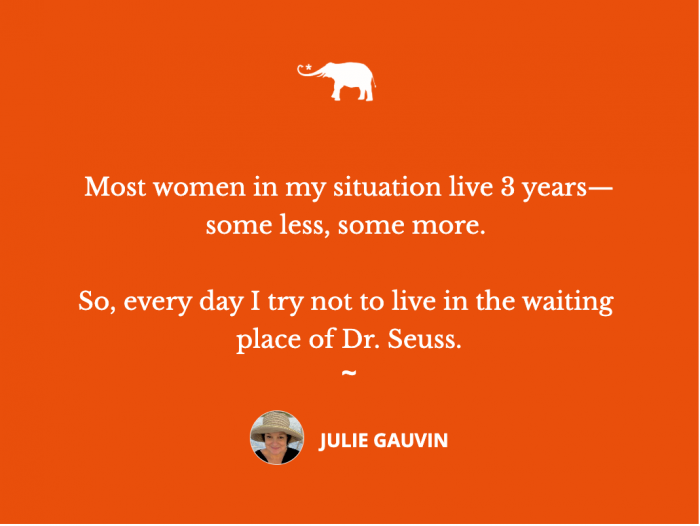Living in the Waiting Place.
Most women in my shoes will live for three years.
Or 2.8 years, depending on where you are getting your data from. In Canada, they don’t actually collect that data, which is utterly insulting.
I accept my disease. I accept whatever fate and timeline are in front of me. Of course, it took some time to get to this point, but once I found faith and steadiness in my soul, I was more peaceful with dying. I am not a religious woman, but I feel a sense that even if I die, that I’m going to be okay.
I can’t explain it better than Rumi when he said,
“My soul is from elsewhere, I’m sure of that, and I intend to end up there.”
Coming to this state took time. It took three straight months in the hospital; it took searing pain, dull pain, you-name-it pain; multiple surgeries; it took time on a respirator, and watching my husband and children say goodbye, fully expecting me to not make it through the night. Some time afterward, my mother told me that the night the doctors told her to gather my three children to bring into the ICU, where I was failing quickly, she felt like she was leading little lambs to the slaughterhouse. She tried to prepare them by telling them their mother was in dire shape, but they didn’t understand until they got there and saw me for themselves.
I don’t remember the details of that evening, but she said she felt they were just thrown in with the wolves when they were brought into the ICU where I lay, still working hard to breathe, but about to be intubated. It is a memory for her that still instantly brings tears to her eyes and mine.
The effects of that night are still carried with each of us, I imagine. I know the image that flashes in my mind is that of my 10-year-old son sobbing at my hospital bedside. I will never forget him standing on my left side, looking at me, red-faced, sobbing, looking utterly alone and heartbroken.
Please mommy, no.
I couldn’t console him, I couldn’t wrap my arms around my baby, I couldn’t get to him. I’m told that he crawled up onto my bed and lay with me on the bed. For a long time afterward when he cried in my arms at night, he could only refer to it as “that night in February.”
Clearly, I did not die, but instead surprised the hell out of everyone.
I have lived with Stage IV Breast Cancer (also called Metastatic disease: meaning the original early-stage breast cancer, despite treatments and time, eventually spread to other parts of the body, in my case the liver and lining of the abdomen, which is called the peritoneum) for 3.4 years now. In that time, there have been periods when I have been sick and disabled, and other times, like now, when I do quite well. The thing with metastatic disease is that you never know when the other shoe will drop.
It will drop, it’s just a matter of when, and then the question becomes whether or not medicine can get control of the monster before it kills you.
No one can predict, or prognose. Most women in my situation live three years, some less, some more. So, every day I try not to live in the waiting place of Dr. Seuss. I try not to think that I am living on borrowed time, past the median life of a woman in my shoes. How am I supposed to balance my life? I am still relatively young and, had I been able to continue to work, I would still have another 10 to 15 years ahead of me.
I’ve thought about taking my retirement now, at 49, because it’s unlikely that I will have a proper retirement with my husband. I could cash in my pension and design my “retirement” around the now, around the reality of my life—not what has a single-digit chance of happening in 15 years. Now, I could go vagabonding with a cool van, or go all out and rent an RV to tour around North America, or better yet, Europe! Take the show on the road?! My son would love that! But then, I am a mother, with a husband who is still working, with all her ducklings still under the roof. It is difficult to justify doing something like that when, financially, you can’t do both.
My cancer is in check now, and the treatments holding it at bay are manageable. I go to the hospital once a month, where friendly nurses stick me with three very large needles; one in the stomach, and two, very slowly, at the same time with one nurse at each hip. The nurses in these chemo units are so well-educated and diligent that I have never felt uneasy in their capability. I just give it all to them. Yes, it hurts, it’s not terrible, but it’s not a piece of cake either.
The tricky part is that I look healthy (albeit probably older than someone my age, and heavier than before with my thick mid-section thanks to being medically induced into menopause (twice!); and yes, of course, some pandemic pounds are on there too). I’m no longer bald, I’m off steroids, off IV nutrition, and I don’t have a nurse coming every day to the house visually reminding everyone that I am not 100% well and able. I feel well most of the time and am back to doing my normal-ish mother and domestic goddess duties. It feels like my family forgets that I am still undergoing treatments and will be for the rest of my life, and those treatments still have side effects that I deal with daily.
When I wake up, happy to see the sunlight, I am also inwardly groaning because my body is sore all over that it hurts to move. Most mornings I reach for a touch of morphine before I rise.
My mornings are slow and often spent lingering with tea, in and around my room. It is tricky for me to bounce out of bed and out the door early, like I used to. The spread of cancer caused a complete intestinal blockage and, subsequently, a year with the most horrid ostomy (aptly nicknamed The Bastard). That is over now, and hallelujah, it was reversed, but things did not just go back to normal. My intestines are very sensitive, almost temperamental, because of it. And who could blame them! Every morning I have to stay close to home, drink my tea, be ready with pain medication and for a sudden quest to the powder room. If I don’t leave time for the ritual, which may entail multiple visits some days, I will be bowled over with pain wherever I am and running for a washroom.
I don’t know if my family really understands what it is like for me on a day-to-day basis. They live with me, see me, and experience it of course, but there are times when it’s obvious they don’t see diseased Mom, instead, they see Mom lying in bed again sleeping, or on her phone. “That’s all she does.”
No, that is what she has to do in order to get up to make dinner tonight.
My brain cannot hold new memories as well, or process thoughts as quickly as it did before all the treatments and trauma. It is embarrassing to not be able to find the right word. Embarrassing to say apple, when I mean to say orange. Stinging to accept the reality that I could never go back to work. I can see people’s reactions, the little bits of frustration they are trying to hide when I can’t remember something or when I get stuck in a story. Little looks. I get some of that at home, when I can’t remember something, someone’s told me, or if I’ve told them a story already. How do I tell my family it makes me want to break out crying every time I am reminded about the effect on my memory?
Often, I make light of my forgetfulness, but I fear that I see disrespect creeping up in my older son, and I wonder how much is because he doesn’t understand the effects of therapies and treatments on the brain, and how much is hidden disdain for a mother who is often unwell and unstable. It must be frustrating for a kid, even the sweetest, most empathetic, kids such as mine. My youngest doesn’t know me except with cancer. I was first diagnosed with early-stage breast cancer all those years ago when he was not yet two, but he did not get the attention that his siblings got and that he deserved, when I had years of treatments and multiple surgeries. It was 10 years later that the recurrence was found.
It is a funny place to be, this waiting place. I don’t want to act sick or be treated with kid gloves, but I desperately need those who surround me to really understand what it’s like for me on the inside.
I live every day with uncertainty, but I live.
I don’t need to jump out of planes to feel alive. I don’t need to go sky-diving or rocky mountain climbing, and I don’t wish for friends to live like they are dying like Tim McGraw wants us to. God, I hate that song. Well, I don’t hate the song, but I hate the message.
In my shoes, what you want is the smell of your child’s hair, the feel of a breeze on your cheeks, and a cup of tea with the sight of the lake at the cottage early in the morning with the light dew glistening on the dock and seeing the blue heron standing straight on the rocks.
In my shoes, I open my eyes every morning with delight.







Read 48 comments and reply